- Home
- Kim Newman
The Man From the Diogenes Club Page 18
The Man From the Diogenes Club Read online
Page 18
‘Tell you what, Ms Jess-F, let’s try BeeTee out on a hypothetical dispute. Put in the set-up of Hamlet, and see what the computer thinks would be best for Denmark.’
‘Big Thinks is not a toy, Mm.’
Moana came back waving some sheaves of paper.
Richard looked over it. Jess-F ground her teeth.
Though the top sheet was headed ‘Input tek: Buster Munro’, this was not the triangle dispute documentation. Richard scrolled through the linked print-out. He saw maps of Northern Europe, lists of names and dates, depositions in non-phonetic English, German and Danish, and enough footnotes for a good-sized doctoral thesis. In fact, that was exactly what this was.
‘I’m not the first to think of running a hypothetical dispute past the mighty computer,’ said Richard. ‘The much-maligned Buster got there before me.’
‘And wound up recategorised as a zenpass,’ said Jess-F.
‘He tried to get an answer to the Schleswig-Holstein Question, didn’t he? Lord Palmerston said only three men in Europe got to the bottom of it – one who forgot, one who died and one who went mad. It was an insanely complicated argument between Denmark and Germany, over the governance of a couple of border provinces. Buster put the question to Big Thinks as if it were a contemporary dispute, just to see how the computer would have resolved it. What did it suggest, nuclear attack? Is that why all the redecoration? Buster’s puzzle blew all the fuses.’
Richard found the last page.
The words ‘forgot died mad’ were repeated over and over, in very faint ink. Then some mathematical formulae. Then the printer equivalent of scribble.
‘This makes no sense.’
He showed it to Jess-F, hoping she could interpret it. He really would have liked Big Thinks to have got to the bottom of the tussle that defeated Bismarck and Metternich and spat out a blindingly simple answer everyone should have seen all along.
‘No,’ she admitted. ‘It makes no sense at all.’
Moana shrugged.
Richard felt a rush of sympathy for Jess-F. This was painful for her.
‘BeeTee can’t do it,’ said Richard. ‘The machine can do sums very fast, but nothing else?’
Jess-F was almost at the point of tears.
‘That’s not true,’ she said, with tattered pride. ‘Big Thinks is the most advanced computer in the world. It can solve any logic problem. Give it the data, and it can deliver accurate weather forecasts, arrange schedules to optimise efficiency of any number of tasks—’
‘But throw the illogical at it, and BeeTee just has a good cry.’
‘It’s a machine. It can’t cry.’
‘Or arbitrate love affairs.’
Jess-F was in a corner.
‘It’s not fair,’ she said, quietly. ‘It’s not BeeTee’s fault. It’s not my fault. They knew the operational parameters. They just kept insisting it tackle areas outside its remit, extending, tampering, overburdening. My techs have been working all the hours of the day—’
‘Kronons, surely?’
‘…all the bloody kronons of the day, just trying to get Big Thinks working again. Even after all this, the ridiculous demands keep coming through. Big Thinks, Big Thinks, will I be pretty, will I be rich? Big Thinks, Big Thinks, is there life on other planets?’
Jess-F put her hands over her face.
‘“They”? Who are “they”?’
‘All of them,’ Jess-F sobbed. ‘Across all disciplines.’
‘Who especially?’
‘Who else? Varno Zhoule.’
‘Not any more?’
‘No.’
She looked out from behind her hands, horrified.
‘It wasn’t me,’ she said.
‘I know. You’re left-handed. Wrong wound pattern. One more question: what did the late Mm Mal-K want from Big Thinks?’
Jess-F gave out an appalled sigh.
‘Now, he was cracked. He kept putting in these convoluted specific questions. In the end, they were all about taking over the country. He wanted to run the whole of the United Kingdom like Tomorrow Town.’
‘The day after tomorrow, the world?’
‘He kept putting in plans and strategies for infiltrating vital industries and dedicating them to the cause. He didn’t have an army, but he believed Big Thinks could get all the computers in the country on his side. Most of the zenvols thought he was a dreamer, spinning out a best-case scenario at the meetings. But he meant it. He wanted to found a large-scale technomeritocracy.’
‘With himself as Beloved Leader?’
‘No, that’s how mad he was. He wanted Big Thinks to run everything. He was hoping to put BeeTee in charge and let the future happen.’
‘That’s why he wanted Vanessa and me out of the story. We were a threat to his funding. Without the subsidies, the plug is pulled.’
‘One thing BeeTee can do is keep track of figures. As a community, Tomorrow Town is in the red. Enormously.’
‘There’s no money here, though.’
‘Of course not. We’ve spent it. And spent money we don’t have. The next monorail from Preston is liable to be crowded with dunning bailiffs.’
Richard thought about it. He was rather saddened by the truth. It would have been nice if the future worked. He wondered if Lincoln Steffens would have had second thoughts during the Moscow purge trials?
‘What threat was Zhoule to Mal-K?’ he asked.
Jess-F frowned. ‘That’s the oddest thing. Zhoule was the one who really encouraged Mal-K to work on his coup plans. He did see himself as, what did you call it, “Beloved Leader”. All his stories were about intellectual supermen taking charge of the world and sorting things out. If anything, he was the visioneer of the tomorrow take-over. And he’d have jumped anything in skirts if femzens wore skirts here.’
Richard remembered the quivering Sue-2.
‘So we’re back to Buster in the conservatory with the Hugo award?’
‘I’ve always said it was him,’ said Jess-F. ‘You can’t blame him, but he did it.’
‘We shall see.’
Sirens sounded. Moana put her fingers in her ears. Jess-F looked even more stricken.
‘That’s not a good sign, is it?’
* * *
The communal meal area outside Big Thinks swarmed with plastic-caped zenvols, looking up and pointing, panicking and screaming. The three light-heat globes, Tomorrow Town’s suns, shone whiter and radiated hotter. Richard looked at the backs of his hands. They were tanning almost as quickly as an instant photograph develops.
‘The fool,’ said Jess-F. ‘He’s tampered with the master controls. Buster will kill us all. It’s the only thing he has left.’
Zenvols piled into the communally owned electric carts parked in a rank to one side of the square. When they proved too heavy for the vehicles, they started throwing each other off. Holes melted in the canopy above the globes. Sizzling drips of molten plastic fell onto screaming tomorrow townies.
The sirens shrilled, urging everyone to panic.
Richard saw Vanessa through the throng.
She was with Zootie. No Gewell.
A one-man hovercraft, burdened with six clinging zenvols, chugged past inch by inch, outpaced by someone on an old-fashioned, non-solar-powered bicycle.
‘If the elements reach critical,’ said Jess-F, ‘Tomorrow Town will blow up.’
A bannerlike strip of paper curled out of a slit in the front of Big Thinks.
‘Your computer wants to say goodbye,’ said Richard.
SURKIT BRAKER No. 15.
‘Not much of a farewell.’
Zootie walked between falling drips to the central column, which supported the three globes. He opened a hatch and pulled a switch. The artificial suns went out. Real sunlight came through the holes in the canopy.
‘Now that’s what computers can do,’ said Jess-F, elated. ‘Execute protocols. If this happens, then that order must be given.’
The zenvol seemed happier about her comp
uter now.
Richard was grateful for a ditch-digger who could read.
* * *
‘This is where the body was?’ he asked Zootie. They were by swimming-pool-sized tanks of green gunk, dotted with yellow and brown patches since the interruption of the light-source. ‘Bit of a haul from Zhoule’s place.’
‘The body was carried here?’ asked Vanessa.
‘Not just the body. The murder weapon too. Who lives in that bungalow?’
On a small hill was a bungalow not quite as spacious as Zhoule’s, one of the mass of hutches placed between the silver pathways, with a crown of solar panels on the flat roof, and a dish antenna.
‘Mm Jor-G,’ said Moana.
‘So you do speak?’
She nodded her head and smiled.
* * *
Gewell sat on an off-white cube in the gloom. The stored power was running down. Only filtered sunlight got through to his main room. He looked as if his backbone had been removed. All the substance of his face had fallen to his jowls.
Richard looked at him.
‘Nice try with the globes. Should have remembered the circuit-breaker, though. Only diabolical masterminds construct their private estates with in-built self-destruct systems. In the future, as in the past, it’s unlikely that town halls will have bombs in the basement ready to go off in the event that the outgoing mayor wants to take the whole community with him rather than hand over the chain of office.’
Gewell didn’t say anything.
Vanessa went straight to a shelf and picked up the only award in the display. It was another Hugo.
‘Best Fan Editor 1958,’ she read from the plaque.
The rocketship came away from its base.
‘You killed him here,’ said Richard, ‘broke your own Hugo, left the bloody rocketship with the body outside. Then, when you’d calmed down a bit, you remembered Zhoule had won the same award. Several, in fact. You sneaked over to his bungalow – no locks, how convenient – and broke one of his Hugos, taking the rocket to complete yours. You made it look as if he were killed with his own award, and you were out of the loop. If only you’d got round to developing the glue of the future and fixed the thing properly, it wouldn’t be so obvious. It’s plain that though you’ve devoted your life to planning out the details of the future, your one essay in the fine art of murder was a rushed botch-up job done on the spur of the moment. You haven’t really improved on Cain. At least Mm Mal-K made an effort with the space-suit and the zapper-prod.’
‘Mm Jor-G,’ said Jess-F, ‘why?’
Good question, Richard thought.
After a long pause, Gewell gathered himself and said, ‘Varno was destroying Tomorrow Town. He had so many… so many ideas. Every morning, before breakfast, he had four or five. All the time, constantly. Radio transmitters the size of a pinhead. Cheap infinite energy from tapping the planet’s core. Solar-powered personal flying machines. Robots to do everything. Robots to make robots to do everything. An operation to extend human lifespan threefold. Rules and regulations about who was fit to have and raise children, with gonad-block implants to enforce them. Hats that collect the electrical energy of the brain and use it to power a personal headlamp. Non-stop, unrelenting, unstoppable. Ideas, ideas, ideas…’
Richard was frankly astonished by the man’s vehemence. ‘Isn’t that what you wanted?’
‘But Varno did the easy bit. Once he’d tossed out an idea, it was up to me to make it work. Me or Big Thinks or some other plodding zenvol. And nine out of ten of the ideas didn’t work, couldn’t ever work. And it was always our fault for not making them work, never his for foisting them off on us. This town would be perfect if it hadn’t been for his ideas. And his bloody dreadful spelling. Back in the fifties, who do you think tidied all his stories up so they were publishable? Muggins Gewell. He couldn’t write a sentence that scanned, and rather than learn how he decreed the language should be changed. Not just the spelling, he had a plan to go through the dictionary crossing out all the words that were no longer needed, then make it a crime to teach them to children. It was something to do with his old public school. He said he wanted to make gerunds extinct within a generation. But he had these wonderful, wonderful, ghastly, terrible ideas. It’d have made you sick.’
‘And the medico who wanted to rule the world?’
‘Him too. He had ideas.’
Gewell was pleading now, hands fists around imaginary bludgeons.
‘If only I could have had ideas,’ he said. ‘They’d have been good ones.’
Richard wondered how they were going to lock Gewell up until the police came.
* * *
The monorail was out of commission. Most things were. Some zenvols, like Jess-F, were relieved not to have to pretend that everything worked perfectly. They had desiyears – months, dammit! – of complaining bottled up inside, and were pouring it all out to each other in one big whine-in under the dead light-heat globes.
Richard and Vanessa looked across the Dales. A small vehicle was puttering along a winding, illogical lane that had been laid out not by a computer but by wandering sheep. It wasn’t the police, though they were on the way.
‘Who do you think this is?’ asked Vanessa.
‘It’ll be Buster. He’s bringing the outside to Tomorrow Town. He always was a yesterday man at heart.’
A car-horn honked.
Zenvols, some already changed out of their plastic suits, paid attention. Sue-2 was excited, hopeful, fearful. She clung to Moana, who smiled and waved.
Someone cheered. Others joined.
‘What is he driving?’ asked Vanessa ‘It looks like a relic from the past.’
‘For these people, it’s deliverance,’ said Richard. ‘It’s a fish ’n’ chip van.’
EGYPTIAN AVENUE
‘This tomb’s leaking sand,’ said Fred Regent. ‘And beetles.’
Fine white stuff, hourglass quality not bucket-and-spade material, seeped from a vertical crack, fanning out around and between clumps of lush, long green grass. Black bugs glittered in morning sunlight, hornlike protrusions rooting through the overgrowth, sand-specks stuck to their carapaces. Fred looked up at the face of the tomb, which was framed by faux-Egyptian columns. The name BUNNING was cut deep into the stone, hemmed around by weather-beaten hieroglyphs.
It was the summer of 197—. Fred Regent, late of the Metropolitan Constabulary, was again adventuring with the supernatural. As before, his guide off life’s beaten track was Richard Jeperson, the most resourceful agent of the Diogenes Club, which remained the least-known branch of Britain’s intelligence and police services. All the anomalies came down to Jeperson. Last month, it had been glam rock-ghouls gutting groupies at the Glastonbury Festival and an obeah curse on Prime Minister Edward Heath hatched somewhere inside his own Cabinet; this morning, it was ghosts in Kingstead Cemetery.
Jeperson, something of an anomaly himself, scooped up a handful of sand and looked down his hawk nose at a couple of fat bugs.
‘Were we on the banks of the great River Nile rather than on a pleasant hill overlooking the greater city of London,’ said Jeperson, ‘I shouldn’t be surprised to come across these little fellows. As it is, I’m flummoxed. These, Fred, are scarabus beetles.’
‘I saw Curse of the Mummy’s Tomb at the Rialto, Richard. I know what a scarab is.’
Jeperson laughed, deepening creases in his tanned forehead and cheeks. His smile lifted black moustaches and showed sharp teeth-points. The man from the Diogenes Club sounded as English as James Mason, but when suntanned he looked more like an Arab, or a Romany disguised as Charles II. His mass of black ringlets was not a wig, though. And no gypsy would dress as gaudily as Richard Jeperson.
‘Of course you do, Fred. I elucidate for the benefit of exposition. Thinking out loud. That is Sahara sand and these are North African beasties.’
‘Absolutely, guv’nor. And that bloody big dead one there is a scorpion.’
Jeperson looked down with amused d
istaste. The scorpion twitched, scuttled and was squashed under Jeperson’s foot.
‘Not so dead, Fred.’
‘Is now.’
‘Let us hope so.’
Jeperson considered his sole, then scraped the evil crushed thing off on a chunk of old headstone.
For this expedition to darkest N6, he wore a generously bloused, leopard-pattern safari jacket and tight white, high-waisted britches tucked into sturdy fell-walker’s boots. His ensemble included a turquoise Sam Browne belt (with pouches full of useful implements and substances), a tiger’s-fang amulet that was supposed to protect against evil, and an Australian bush hat with three corks dangling from the rim. Champagne corks, each marked with a date in felt-tip pen.
‘The term for a thing so out of place is, as we all know, an “apport”,’ said Jeperson. ‘Unless some peculiar person has for reasons unknown placed sand, scarabs and scorps in our path for the purpose of puzzlement, we must conclude that they have materialised for some supernatural reason. Mr Lillywhite, this is your belief, is it not? This is yet another manifestation of the spookery you have reported?’
Lillywhite nodded. He was a milk-skinned, fair-haired middle-aged man with burning red cheeks and a peacock’s-tail-pattern smock. His complaint had been passed from the police to the Diogenes Club, and then fielded to Jeperson.
‘What is all this doing here?’ asked Vanessa, Jeperson’s other assistant – the one everyone noticed before realising Fred was in the room. The tall, model-beautiful redhead wore huge sunglasses with swirly mint-and-yellow patterns on the lenses and frames, a sari-like arrangement of silk scarves that exposed a ruby winking in her navel, and stack-heeled cream leather go-go boots. Beside the other two, Fred felt a bit underdressed in his Fred Perry and Doc Martens.

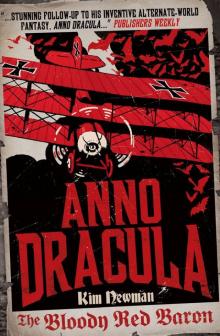 The Bloody Red Baron
The Bloody Red Baron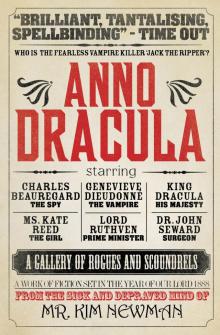 Anno Dracula
Anno Dracula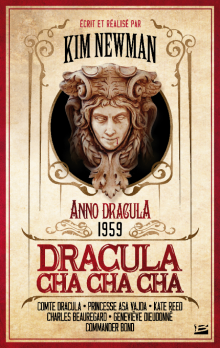 Dracula Cha Cha Cha
Dracula Cha Cha Cha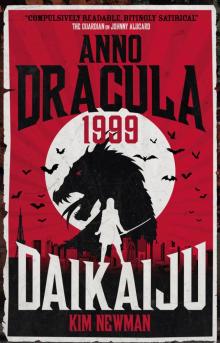 Anno Dracula 1999
Anno Dracula 1999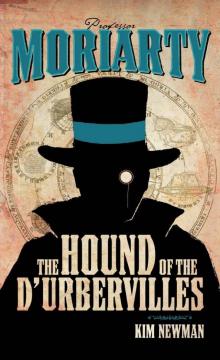 Moriarty: The Hound of the D'Urbervilles
Moriarty: The Hound of the D'Urbervilles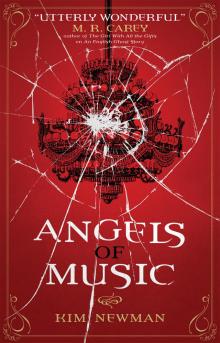 Angels of Music
Angels of Music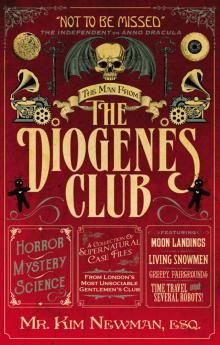 The Man From the Diogenes Club
The Man From the Diogenes Club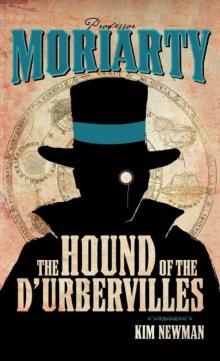 Professor Moriarty: The Hound Of The D’urbervilles
Professor Moriarty: The Hound Of The D’urbervilles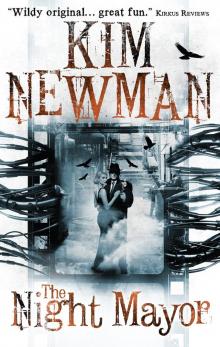 The Night Mayor
The Night Mayor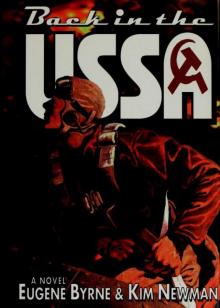 Back in the USSA
Back in the USSA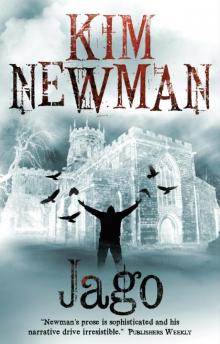 Jago
Jago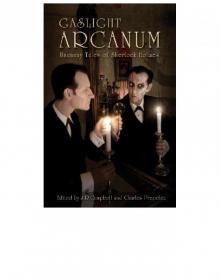 Gaslight Arcanum: Uncanny Tales of Sherlock Holmes
Gaslight Arcanum: Uncanny Tales of Sherlock Holmes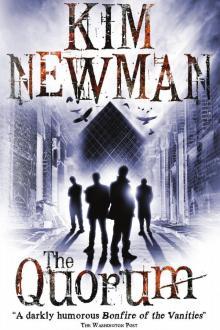 The Quorum
The Quorum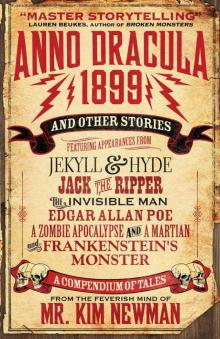 Anno Dracula 1899 and Other Stories
Anno Dracula 1899 and Other Stories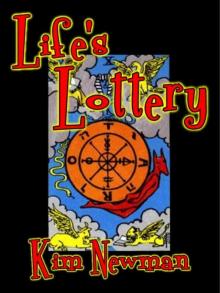 Life's Lottery
Life's Lottery The Secrets of Drearcliff Grange School
The Secrets of Drearcliff Grange School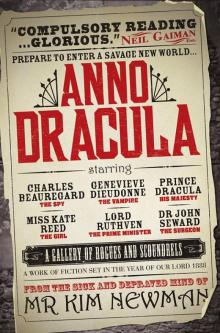 Anno Dracula ad-1
Anno Dracula ad-1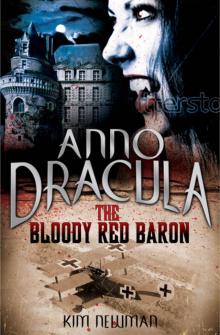 The Bloody Red Baron: 1918 ad-2
The Bloody Red Baron: 1918 ad-2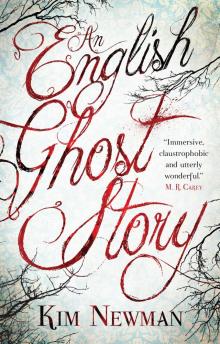 An English Ghost Story
An English Ghost Story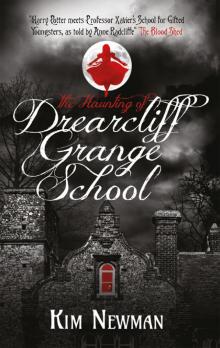 The Haunting of Drearcliff Grange School
The Haunting of Drearcliff Grange School The Other Side of Midnight
The Other Side of Midnight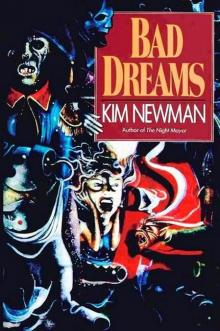 Bad Dreams
Bad Dreams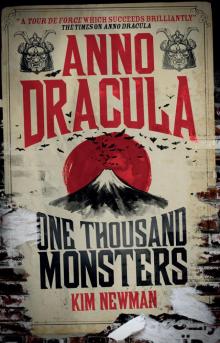 Anno Dracula--One Thousand Monsters
Anno Dracula--One Thousand Monsters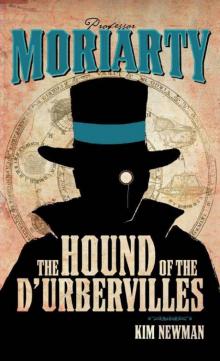 The Hound Of The D’urbervilles
The Hound Of The D’urbervilles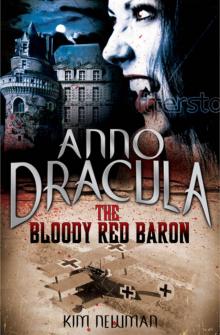 The Bloody Red Baron: Anno Dracula 1918
The Bloody Red Baron: Anno Dracula 1918